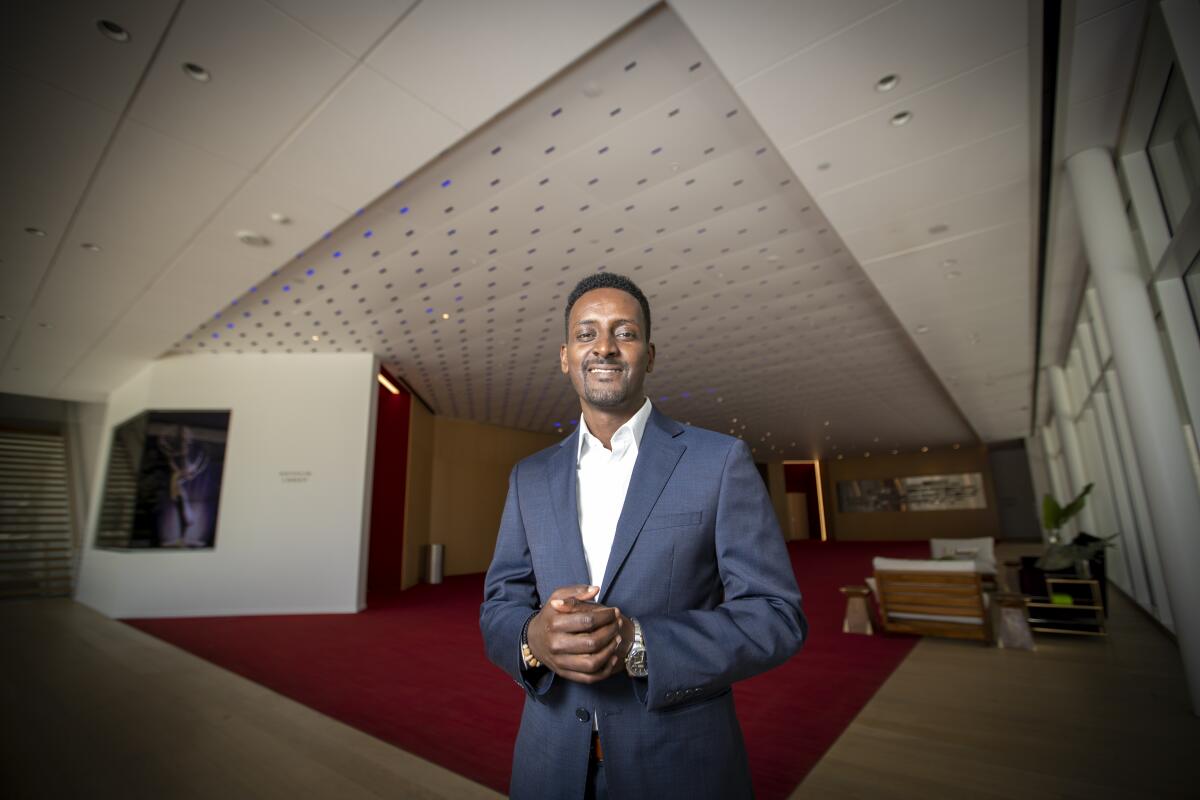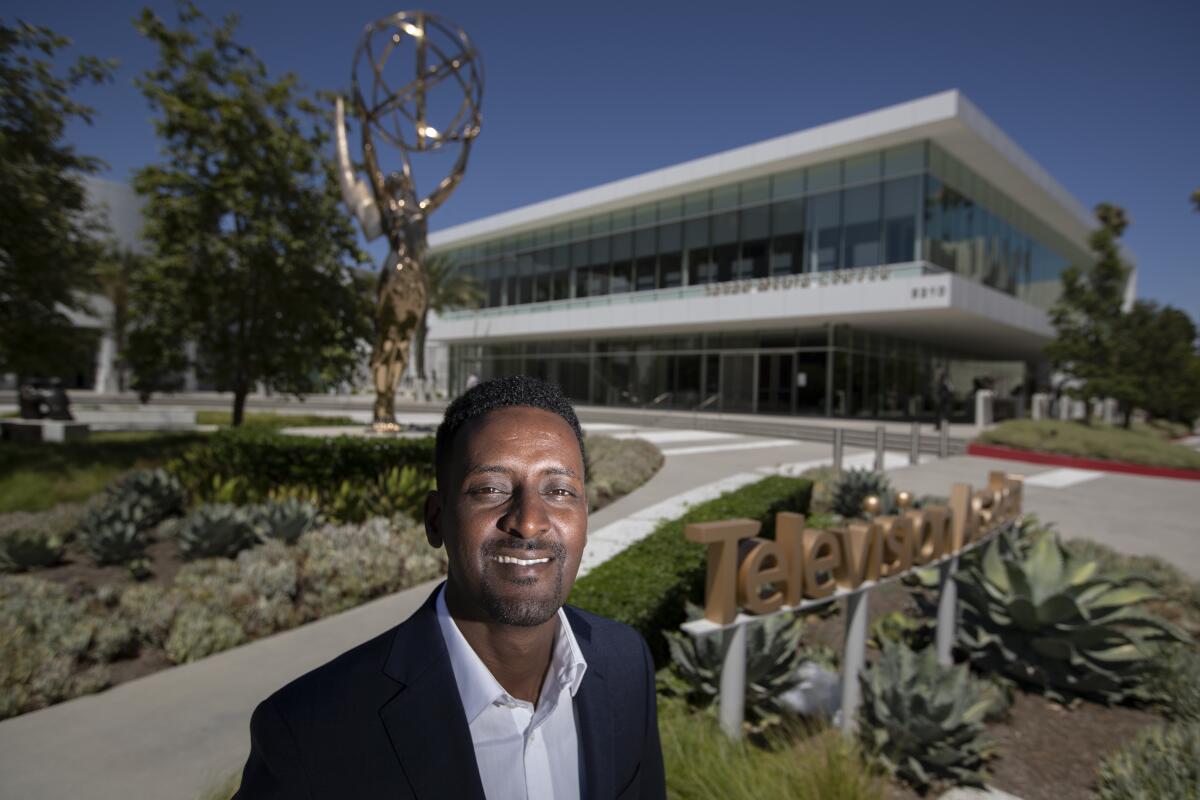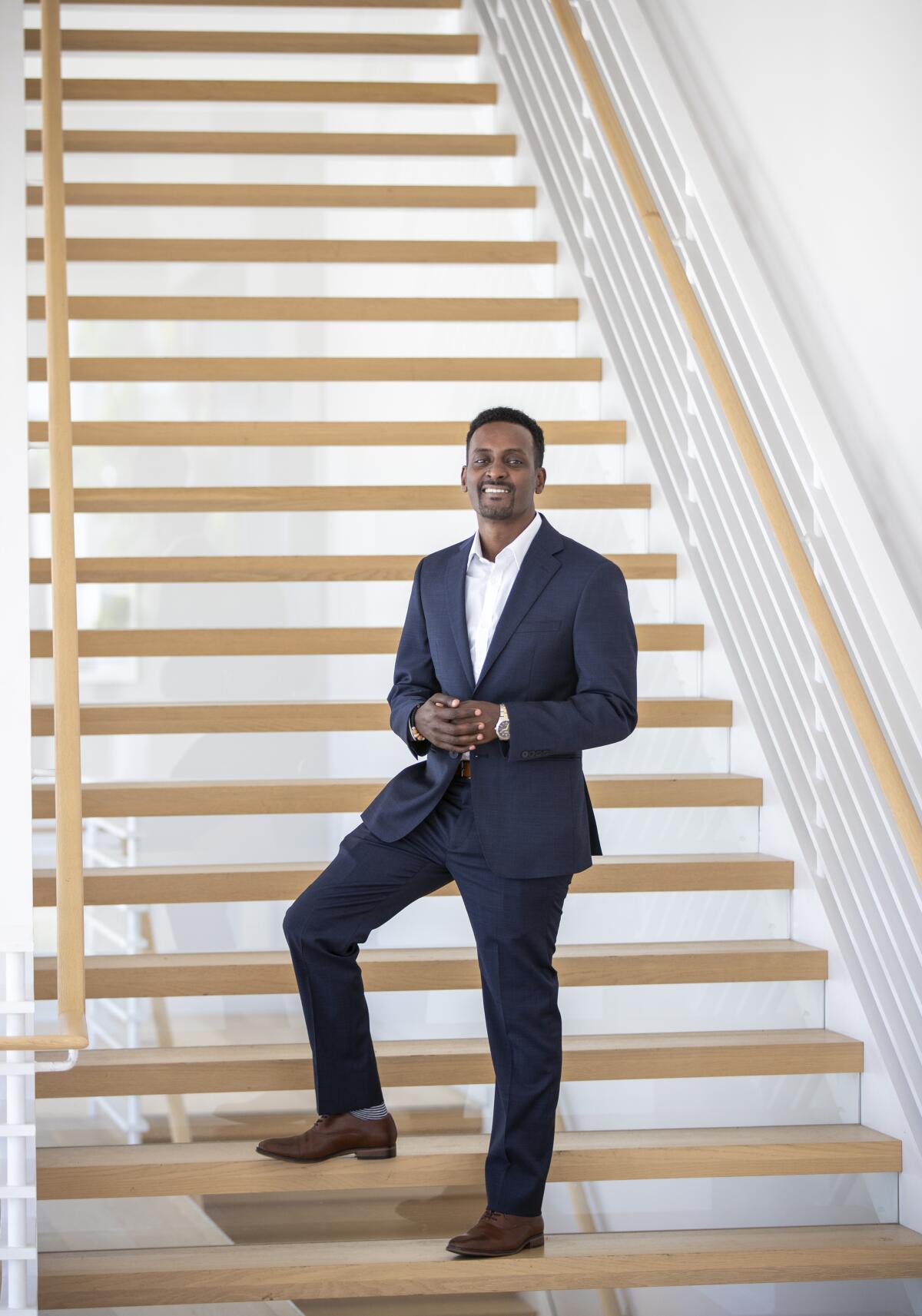Azi Hussen’s path from Sudan refugee camp to TV internship

- Share via
Azigza Hussen doesn’t fit the profile of the ordinary showbiz intern, but that’s because his life has been anything but ordinary.
His journey took him from refugee camps in war-torn Africa to the Television Academy Foundation in North Hollywood, where he’s part of a program aimed at fostering diversity. The program, started more than 30 years ago, has led to hundreds of jobs in the industry for graduates who’ve won multiple Emmy awards and nominations.
Now 29, Hussen believes there’s a connection between the world he came from and the one he aspires to. “Everybody has a unique story— everybody in this world, that’s what I believe — which means that ... [the stories] could be an inspirational source for anybody.”
Hussen was born in 1989 in Eritrea to two teenage Ethiopian parents during a nearly 30-year conflict between those countries. His parents played an active role in the ongoing war — his father was a soldier, and his mother was a cook for the Ethiopian soldiers — meaning Hussen spent his early years in a military camp.
In 1991, when the conflict was coming to an end and it was evident his parents’ side was defeated, Hussen and his mother embarked on a dangerous journey to Sudan. The conditions on this trip were so extreme that people sold off children to desert nomads in exchange for water, while others resorted to drinking their own bodily fluids.
“On our way to the Sudan Red Cross camp, [my mother] couldn’t handle it anymore,” said Hussen. “She gave me to another soldier that was a very close friend to my father. She said, ‘If I survive, find me and you will give me back my child. Otherwise give it to the state or somebody in the camp that we are going to.’ ”
Once Hussen reached the camp, he reunited with his mother and father. After six months in Sudan, his parents went to Ethiopia with a small stipend and a bag of grain. Upon arriving in Ethiopia, Hussen’s father abandoned him and his mother, taking both the money and the grain.

Realizing she was unable to provide for her child, Hussen’s mother made the difficult choice to send Hussen to live with her husband’s parents. She was an Orthodox Christian and feared that living with Hussen’s Muslim paternal grandparents would lead to political and religious problems.
For 10 years Hussen had essentially no contact with either of his parents, and when he was 12, his grandmother died, leaving him without a home.
“I remember those times I spent outside,” Hussen recalled. “I had nobody.”
Not long after Hussen ended up on the street, his father went to Ethiopia to take his son with him to Sweden, where he had been working. So Hussen moved again, this time to a country with a language, culture and custom completely foreign to him, with a father he barely knew.
At 17, Hussen received messages from someone he hadn’t heard from since he was 2: his mother.
Growing up, Hussen believed his mother died when he was very young, so finding out she was alive was jarring. He refused to talk to her for a long time.
“I was very mad. I was very young. I couldn’t talk to her,” he recalled. “But at some point I said, ‘No, I have to.’ ”
Around that time, Hussen got involved with Fanzingo, a Swedish media lab that promotes opportunities for storytellers from underrepresented communities. With the help of Fanzingo, Hussen decided to document his meeting with his mother.
“So I ended up traveling to Ethiopia with a camera and then just recorded everything that happened,” Hussen noted. “I ended up coming back to Sweden with 17 hours of video-cassette with everything that she said.”

Using this footage, Hussen condensed the meeting into a 10-minute film titled “Back to Mama.”
“Since that movie, I understood the power of visual media,” recalled Hussen. “I got the privilege to screen [it] at different festivals, colleges, nonprofit organizations, and what I received back from them was like ,’Oh my gosh.’ A little 10-minute video documentary can give me so much appreciation and excitement, why can’t I just aim [higher] and go bigger to be a better filmmaker?”
After that, Hussen studied at the Stockholm Academy of Dramatic Arts. However, he was unable to finish because his mother became ill and he needed to take care of her. But a little later Hussen got a job with Swedish National Television. After working there for over two years, Hussen enrolled in Montgomery College in Maryland.
At Montgomery College, Hussen learned of an internship program with the Television Academy Foundation, the nonprofit branch of the academy. Each year the program pairs 50 graduate and undergraduate students from under-served, underrepresented communities with internships at the biggest studios in Hollywood.
“We’re a nonprofit that provides the educational programs and all the things that are really working to create a more diverse and inclusive industry,” said Jodi Delaney, executive director of the Television Academy Foundation. She noted that the foundation’s 2019 internship class is 73% female and 60% students of color.
“Since the program started in the 1980s we’ve had over 1,200 interns now over time, and our [participant] pool is really interesting,” said Delaney. “We’ve had nine Emmy winners [in the program] and over 20 nominees.”

Hussen learned of the program just two days before the deadline, so he rushed home to write his personal statement and filled out all necessary documents, while two of his professors speedily wrote recommendations. His application was filed the day of the deadline, and he ended up being selected for the internship.
The TV Academy Foundation paired Hussen with Warner Horizon, a division of the Warner Bros. Television Group, for an eight-week internship that has him working in development in the unscripted television department, following the process of creating a TV show, from initial pitch to final edit.
It’s been a long road, but Hussen feels closer than ever to achieving his goals.
“Since I was a little kid I was a big dreamer ... and I still dream big,” Hussen said. “I hope that I will, very soon, move to L.A. and start working in the film industry.”
More to Read
The complete guide to home viewing
Get Screen Gab for everything about the TV shows and streaming movies everyone’s talking about.
You may occasionally receive promotional content from the Los Angeles Times.






